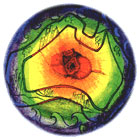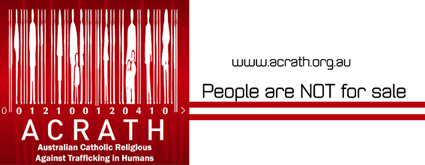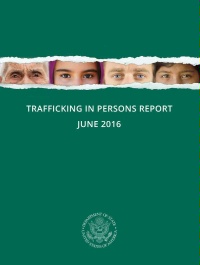|
For the past nine years Mercy Sisters in Australia have been active members of the Australian Catholic Religious Against Trafficking in Humans (ACRATH). ACRATH is an Australia-wide network of religious Sisters, priests and brothers from a number of Congregations and Institutes and their co-workers, who collaborate to address the challenges related to eradicating human trafficking. ACRATH is supported by the national association of Catholic Religious Leaders of Australia (CRA).
 As the majority of the Mercy family engaging in initiatives against human trafficking are actively involved in many different ways with the ACRATH network, this description of Mercy involvement to oppose human trafficking is being addressed through this lens. As the majority of the Mercy family engaging in initiatives against human trafficking are actively involved in many different ways with the ACRATH network, this description of Mercy involvement to oppose human trafficking is being addressed through this lens.
The Aims of the ACRATH Network are:
a) Raise Awareness about Human Trafficking, its causes and scope for local action
b) Undertake work to ensure the needs of people who have been trafficked are met
c) Collaborate with like-minded organisations in Australia, Asia-Pacific region and internationally.
d) Advocate for measures, including new legislation, at state and national level, to address human trafficking as a serious crime and to offer maximum assistance to victims of trafficking.
To achieve these aims, ACRATH works collaboratively with the Australian Federal Police, the State Police and Department of Immigration Australia, to address the criminal aspect of human trafficking. In terms of achieving the other aims ACRATH members meet regularly within the six States to plan and organise their work around trafficking issues. Annually, the executive members from each State gather for a national conference.
In January 2016 representatives of ACRATH attended the meeting in Rome of Talitha Kum, the International Network of Consecrated Life against Trafficking in Persons. At the end of the gathering a Declaration encouraging all members to take a stance was issued and to commit ourselves ‘with renewed energy for the protection, promotion and fulfilment of the rights of our sisters and brothers held in slavery’, and ‘to denounce all forms of trafficking in persons’. This echoes the approach of the Mercy family to work in collaboration and solidarity, to confront the causes that generate trafficking in humans.
Over the years ACRATH has developed relevant resource materials, including educational resources available on their website for use by teachers and students of second level schools and colleges. Providing workshops on all aspects of human trafficking is an integral part of ACRATH’s work to raise awareness with adult groups, college students, criminal law students at Australian Catholic University and other groups. ACRATH members are also available to meet with parish representatives in dioceses throughout Australia. Increasingly members are receiving invitations to speak to groups of other religious denominations.
Annual Visit To The Federal Parliament in Canberra
An important annual event for ACRATH members is their meeting with the members of the Federal and State Parliaments to advocate for improved laws to help trafficked people and to prevent trafficking.
Eleven ACRATH advocates were in Canberra in 2015. During this visit ACRATH acknowledged the recent positive changes to the Human Trafficking Visa Framework and the establishment of the Supply Chains Working Group of the National Roundtable on Human Trafficking and Slavery. The two main advocacy points for the visit to Federal Parliament were forced marriage and forced labour. During the four days of their visit ACRATH members met with 52 Members of Parliament and Advisors. Important meetings outside Parliament House were also held.
ACRATH Communication Initiatives
 ACRATH makes extensive use of the media to promote awareness of their work to oppose human trafficking. In an effort to reach victims/survivors of HT and to raise awareness with a wider audience, ACRATH is working with Community Radio Stations . This initiative is vital in terms of reaching out to ethnic communities, to provide Community Services Announcements (RAP), in various Asian languages. The messages broadcast provide concrete information as to where trafficked people can receive help and assistance. This is of critical importance in an effort to reach the women and men who have been trafficked into Australia from neighbouring Asian countries like the Philippines, Thailand and Malaysia. These programs are available at present in Victoria and South Australia and will beintroduced in other states in the near future. ACRATH makes extensive use of the media to promote awareness of their work to oppose human trafficking. In an effort to reach victims/survivors of HT and to raise awareness with a wider audience, ACRATH is working with Community Radio Stations . This initiative is vital in terms of reaching out to ethnic communities, to provide Community Services Announcements (RAP), in various Asian languages. The messages broadcast provide concrete information as to where trafficked people can receive help and assistance. This is of critical importance in an effort to reach the women and men who have been trafficked into Australia from neighbouring Asian countries like the Philippines, Thailand and Malaysia. These programs are available at present in Victoria and South Australia and will beintroduced in other states in the near future.
Slavery Free Chocolate Easter Campaign
This campaign is one of the highlights of the ACRATH year. Many ACRATH members and supporters work hard to have mateial published and disseminated before and during Lent. The campaign is a collaboration involving Caritas Australia, Archdioceses and dioceses, Social Justice Commissions and Committes, Stop the Traffik and other Australian groups. This year the information was picked up from the News Release by bigger organisations and was once again circulated to the Mercy family worldwide through Mercy eNews. When we understand that thousands of children are trafficked in West Africa to pick and harvest the cocoa beans that produce our Easter eggs we have a good reason to join the campaign also.
National ACRATH Team Membership
At the National Executive Meeting in February 2014, Anne Tormey rsm (South Australia) was elected as National President of ACRATH and Carmel Heagerty rsm (Victoria) was elected National Secretary. Carole McDonald rsm was re-elected as Regional Coordinator (Victoria). In the same year Christine Carolan, who has worked closely with Mercy Global Action and ran a workshop for MIA, was appointed the Executive Officer of ACRATH. In addition to the Mercy sisters on the National Executive, other members of the Mercy family are also actively involved in the work of ACRATH. Their responsibility and engagement with anti-trafficking issues will have an impact re furthering awareness on HT among Mercy and the wider global network of Mercy International Association.
ACRATH Network Links to Other Non-Government Organisations
ACRATH works closely with other NGOs engaged in opposing HT, among them are the Salvation Army, the Red Cross, Project Respect, Anti-trafficking Australia, Stop the Traffik Australia, Global Freedom Network. Among the issues discussed with these groups and also during their annual meetings with Federal Members of Parliament are: Slavery Free Supply Chain Campaign and Federal Compensation Scheme, more suitably named ‘visas and longer stay visas for victims’.
ACRATH Works Globally with the United Nations (UN)
A group of ACRATH members worked on the Report for the Universal Periodic Review (UPR) presented by Australia to the UN in 2015. The UPR involves a review of the human rights records of all UN Member States. With human trafficking, millions of people are deprived of their rights. Angela Reed rsm is currently resident at the Mercy Global Action Office in New York where she has given a number of presentations on the issue of HT in the Philippines, based on the work for her thesis.
 Trafficking in Persons (TIP) Report 2016 Trafficking in Persons (TIP) Report 2016
The Trafficking in Persons Report, or TIP Report, is an annual report issued by the U.S. State Department's Office to Monitor and Combat Trafficking in Persons. It ranks governments based on US research of their efforts to acknowledge and combat human trafficking.
In the TIP Report, the Department of State places each country onto one of three tiers based on the extent of their governments’ efforts to comply with the “minimum standards for the elimination of trafficking” found in Section 108 of the TVPA.
View the TIP Report 2016 for Australia (Tier 1)
Papua New Guinea Engages with ACRATH
Two Mercy sisters from Papua New Guinea, and an ACRATH member from Perth attended the Caritas International Conference on Anti-trafficking in the Asia-Pacific region which was held in Jakarta in 2014. The over-arching theme was “Every human being is made in the image and likeness of God.” The sisters, in their report on the conference said it was an informative experience for them, especialy re the many forms of exploitation, and the underlying causes of human trafficking which are closely related to poverty, greed and demand. Action plans in collaboration with others on HT issues in PNG are being put in place.
View the TIP Report 2016 for Papua New Guinea (Tier 3)
Find out more about ACRATH:
- Visit the ACRATH website
- Sign up to receive the ACRATH newsletter (No charge)
- Sign up to receive the ACRATH “Information and Campaign” notice (an email every 3-4 weeks)
Catherine Gibbons rsm
Mercy Global Action
June 2016
|


 ACRATH makes extensive use of the media to promote awareness of their work to oppose human trafficking. In an effort to reach victims/survivors of HT and to raise awareness with a wider audience, ACRATH is working with Community Radio Stations . This initiative is vital in terms of reaching out to ethnic communities, to provide Community Services Announcements (RAP), in various Asian languages. The messages broadcast provide concrete information as to where trafficked people can receive help and assistance. This is of critical importance in an effort to reach the women and men who have been trafficked into Australia from neighbouring Asian countries like the Philippines, Thailand and Malaysia. These programs are available at present in Victoria and South Australia and will beintroduced in other states in the near future.
ACRATH makes extensive use of the media to promote awareness of their work to oppose human trafficking. In an effort to reach victims/survivors of HT and to raise awareness with a wider audience, ACRATH is working with Community Radio Stations . This initiative is vital in terms of reaching out to ethnic communities, to provide Community Services Announcements (RAP), in various Asian languages. The messages broadcast provide concrete information as to where trafficked people can receive help and assistance. This is of critical importance in an effort to reach the women and men who have been trafficked into Australia from neighbouring Asian countries like the Philippines, Thailand and Malaysia. These programs are available at present in Victoria and South Australia and will beintroduced in other states in the near future. Trafficking in Persons (TIP) Report 2016
Trafficking in Persons (TIP) Report 2016